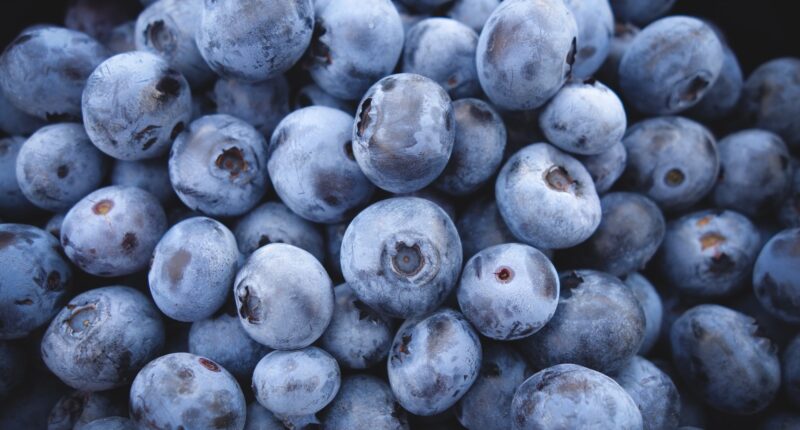Blueberries, also known as the “King of Antioxidants,” are a superfruit with numerous health benefits. Here are five ways blueberries can help you stay healthy, as well as simple ways to incorporate them into your meals, snacks, and drinks.
Rich in Nutrients
One cup of fresh blueberries contains 85 calories, 0.7 grams of protein, no fat, and about 15 grams of carbohydrates. Blueberries also provide 86 milligrams of potassium, 13 milligrams of phosphorous, and 12 milligrams of calcium, according to the Department of Agriculture.
That same portion also packs about three ounces of water and 8.1 milligrams of vitamin C, the latter being an antioxidant that is important for your skin and bones, according to the National Library of Medicine.
Protects Against Disease
Blueberries have powerful antioxidant capabilities. Antioxidants are substances that can prevent cell damage, according to the National Library of Medicine.
A single serving of blueberries has more antioxidant capacity than a serving of plums, strawberries, or cranberries, according to the Department of Agriculture. The antioxidants in blueberries have been shown to curb inflammation and reduce oxidative stress, according to an article published in 2017 in the journal Food & Function.
A 2018 study published in the International Journal of Molecular Sciences concludes that blueberries may be one of the best functional fruits due to the protective activity of their anthocyanin and polyphenol antioxidants.
Blueberries can also help to regulate blood pressure as well as reduce the risk of diabetes, according to the Department of Agriculture.
Improves Heart Health
According to the Centers for Disease Control and Prevention (CDC), heart disease is the leading cause of death in the United States.
Blueberries may offer some potent protection. According to an article from 2018 in the Journal of Agriculture and Food Chemistry, blueberries protect against artery hardening, a condition that ups the risk of heart attack and stroke. That’s due to their ability to reduce inflammation and oxidative stress.
Additionally, a study from 2019 in The American Journal of Clinical Nutrition compared the effects of consuming one cup of blueberries daily to a placebo in people with metabolic syndrome. Metabolic syndrome occurs when someone has risk factors for certain diseases such as heart disease and diabetes, per the National Library of Medicine.
The blueberry eaters experienced sustained improvements in artery function, including reduced stiffness and positive changes in cholesterol profiles. The results led researchers to conclude that blueberries should be included in dietary strategies to reduce heart disease risk.
Enhances Brain Function
A 2019 analysis from The Journals of Gerontology examined the relationship between blueberries and cognitive performance. The review found that blueberries have improved memory and psychomotor function in older healthy adults and adults with mild cognitive impairment.
Berries are also the only fruit singled out in the MIND Diet, which combines aspects of the Mediterranean diet and the DASH diet to create an eating plan focused on preventing dementia and age-related cognitive decline, per the Harvard T.H. Chan School of Public Health.
Aids in Muscle Recovery
The wear and tear on muscles during exercise can trigger exercise-induced muscle damage (EIMD).
According to a study published in 2012 in the Journal of the International Society of Sports Nutrition, what athletes eat before and after exercise can potentially offset EIMD. In the study, athletes consumed either a blueberry smoothie or a placebo drink of a similar antioxidant capacity before and after EIMD, induced by strenuous strength training.
Researchers found a faster rate of muscle strength recovery in the blueberry intervention group, concluding that blueberry consumption triggers adaptive events in the body that accelerate muscle repair.
How To Eat Blueberries
You can add blueberries to your beverages by tossing slightly mashed blueberries into flat or sparkling water, along with fresh mint or basil. Or you can freeze them in ice cubes to add color and nutrients to your glass.
You can also incorporate blueberries into foods like overnight oats and parfaits, pancakes, baked goods, acai bowls, and chia puddings.
For a quick and nourishing treat, make a simple mock cobbler. Warm the berries on the stovetop over low heat with freshly grated ginger. Top with a crumble made from almond butter, oats, and cinnamon combo.
Blueberries also work well in savory dishes. Add them to hot or chilled wild rice, quinoa, kale salad, black bean tacos, jam, and chutney made with onions and herbs.
A Quick Review
Blueberries have several health benefits that can improve your brain, heart, and muscle health. Not only that, but they’re filled with antioxidants that can protect against diseases like cancer and diabetes.
However you enjoy them, whether you add them to your smoothies or oatmeal or just eat them out of the carton, they will make a nutritious and delicious addition to your diet.
READ NEXT: 8 Important Health Benefits Of Watermelon You Didn’t Know









